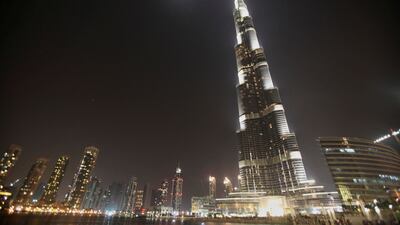The UAE economy is flourishing again and is set to expand by an annual 5.4 per cent this year, driven by the country’s success in containing the health and economic impacts of the coronavirus pandemic, the latest figures from the Central Bank of the UAE reveal.
The 2022 real gross domestic product growth estimate is higher than the 4.2 per cent projection the CBUAE made in April, the banking regulator said in its 2021 annual report released on Monday.
The Arab world’s second-largest economy, which expanded 3.8 per cent in 2021, is expected to grow another 4.2 per cent in 2023 as growth momentum continues.
The country’s non-oil economy will expand by 4.3 per cent this year after growing 5.3 per cent last year. The growth is estimated to moderate to 3.9 per cent next year, according to central bank data.
Overall GDP growth will be supported by a robust 8 per cent jump in the UAE’s oil economy in 2022, which is expected to grow another 5 per cent next year amid higher crude prices.
"Despite the numerous economic challenges caused by the Covid-19 pandemic in 2021, the UAE was able to excel on the economic front, and even improve its competitiveness, thanks to the overall vision and timely policies enacted by our leadership,” said Sheikh Mansour bin Zayed, Deputy Prime Minister and Minister of Presidential Affairs, who is chairman of the CBUAE board.
“The International Monetary Fund noted our nation’s unique ability to face the repercussions of Covid-19 in its Annual Report for 2021, which praised the UAE for its strong and proactive response to the pandemic’s effects.”
The IMF report points out the country’s continued push to implement policies “aimed at supporting economic growth”, Sheikh Mansour said.
The UAE economy, which CBUAE estimates contracted 4.8 per cent in 2020 on the back of the global economic slowdown, has bounced back strongly. The recovery has been driven by pandemic-mitigation measures and Dh388 billion ($105.72bn) in fiscal and monetary support since the onset of the global health crisis.
The fiscal and monetary support measures to businesses and individuals include the central bank's Dh50bn Targeted Economic Support Scheme to boost liquidity in the financial and banking sector, parts of which were extended to June this year.
The IMF projects the UAE economy will grow 4.2 this year, while Japan's largest lender MUFG expects it to grow 4.9 per cent. Emirates NBD forecasts growth of 5.7 per cent and Abu Dhabi Commercial Bank estimates a 5.4 per cent expansion, supported by a sharp rise in the oil sector.
As for the country's non-oil economy, Emirates NBD estimates 4 per cent growth for 2022, while ADCB forecasts an expansion of 3.4 per cent.
Oil prices, which rose 67 per cent last year, have continued to increase this year.
Brent, the global benchmark for two thirds of the world's oil, and West Texas Intermediate, the gauge that tracks US crude, are both up more than 50 per cent since the beginning of this year, as developed economies recover from the pandemic, Russia's military offensive continues into its fourth month and the EU presses forward with banning most of Russian oil imports by the end of this year.
The UAE’s current account surplus in the balance of payments rose to Dh176.2bn in 2021 from Dh77.5bn in 2020, as both oil and non-oil exports increased, the CBUAE said.
Deputy Prime Minister and Minister of Presidential Affairs and chairman of the CBUAE board
The banking system in the UAE remained robust last year with healthy levels of capitalisation and liquidity. Equity, liquid assets and other indicators reflect the improvement of liquidity conditions in the market, the regulator said.
“The resilience characterising the UAE’s banking and insurance sectors played a prominent role in defining a benchmark for dealing effectively with future crises, without compromising the principles of sound risk management,” Sheikh Mansour said.
“This aligns with international best practice, which has reinforced confidence and credibility in the nation’s financial services sector.”
The strength of the country’s financial system supports CBUAE's outlook. The economic recovery is gaining steady momentum on the back of an “early and strong response” to various challenges and supportive macroeconomic policies, the regulator said.
“2021 contained a mix of challenges and opportunities. The CBUAE played a critical role in steering the nation through the economic challenges of the Covid-19 pandemic,” Central Bank Governor Khaled Balama said.
“It applied a rigorous policy-based approach to the banking and insurance sectors that it regulates and supervises, responding to evolving economic developments and providing leadership in difficult times.”
The CBUAE said its strategic plan for 2023-2026 sets out its mission to be among the “top central banks globally” in promoting monetary and financial stability and supporting the UAE’s competitiveness.
“Our mission at the CBUAE in 2022 is clear and focused,” Mr Balama said.
“We aim to enhance monetary management and financial stability, and to protect consumers through effective supervision of licensed financial institutions, prudent management of reserves, robust financial infrastructure and the adoption of digital technologies.”


